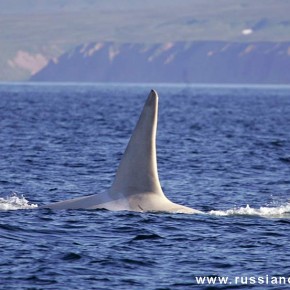“There she blows! A hump like a snow-hill! It is Moby Dick!”
By now, Captain Ahab is stirring in his grave at reports of a white killer whale—or orca—spotted off the coast of Kamchatka in eastern Russia. But this isn’t the fictitious white sperm whale of Herman Melville’s Moby Dick. It’s the first sighting of an all-white adult orca in the wild.
The white whale—appropriately nicknamed Iceberg—was spotted by Russian scientists and students during a research cruise in the wild and windy waters of the Russian Far East. It appears to be healthy and is living in its pod. Orcas, by nature, are social creatures.
Based upon the size of the dorsal fin—two meters high—researchers estimate that the whale is an adult male around 16 years old, although his ragged fin may mean he’s actually older. Male orcas can live up to 50 or 60 years old, although 30 years is more common.
 The research expedition is co-led by Erich Hoyt, orca-scientist, conservationist, and author, and now a senior research fellow with the Whale and Dolphin Conservation Society (WDCS).
The research expedition is co-led by Erich Hoyt, orca-scientist, conservationist, and author, and now a senior research fellow with the Whale and Dolphin Conservation Society (WDCS).
“We’ve seen another two white orcas in Russia but they’ve been young, whereas this is the first time we’ve seen a mature adult,” he told BBC News.
The cause of the white orca’s unusual pigmentation is unknown. A captive white orca named Chima died in captivity in Canada in 1972. It suffered from a genetic condition—Chediak-Higashi syndrome—that causes partial albinism as well as medical complications.
A biopsy of Iceberg would provide additional information, but researchers are reluctant to do that unless there is a more convincing reason. Instead, they will try to make closer observations.
In the meantime, Iceberg continues to swim faithfully behind his mother, as orcas do throughout their lives, presumably with his brothers alongside him.
__________
Photo and video by Far East Russia Orcas Project


